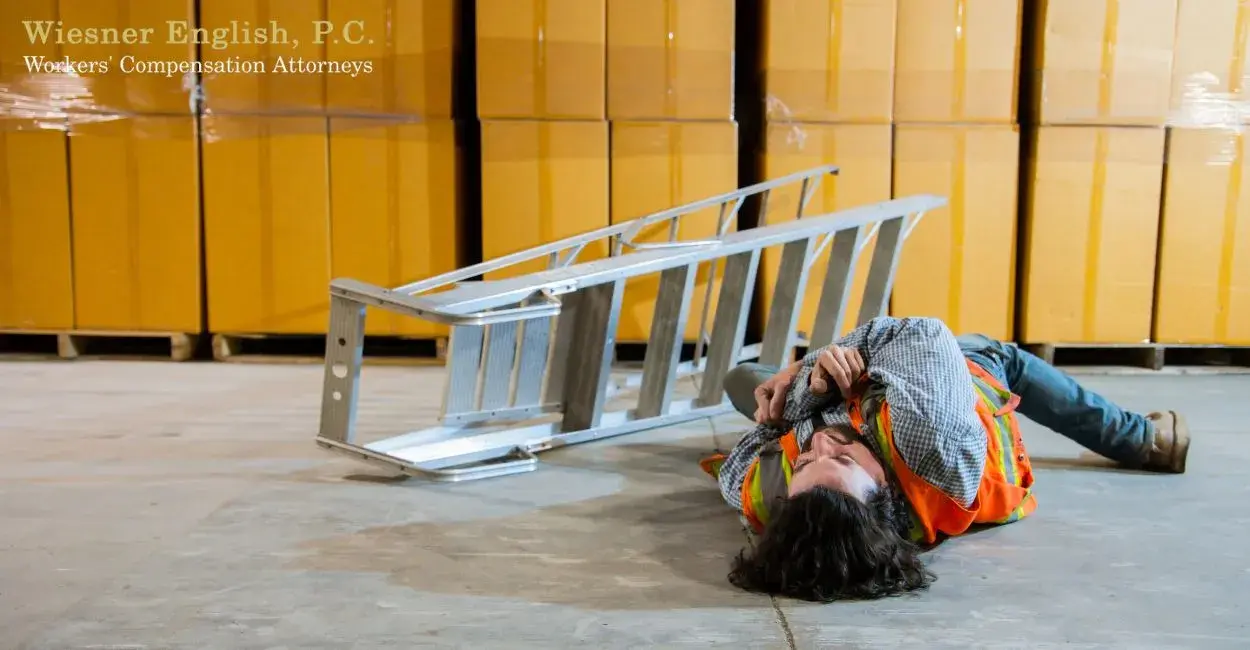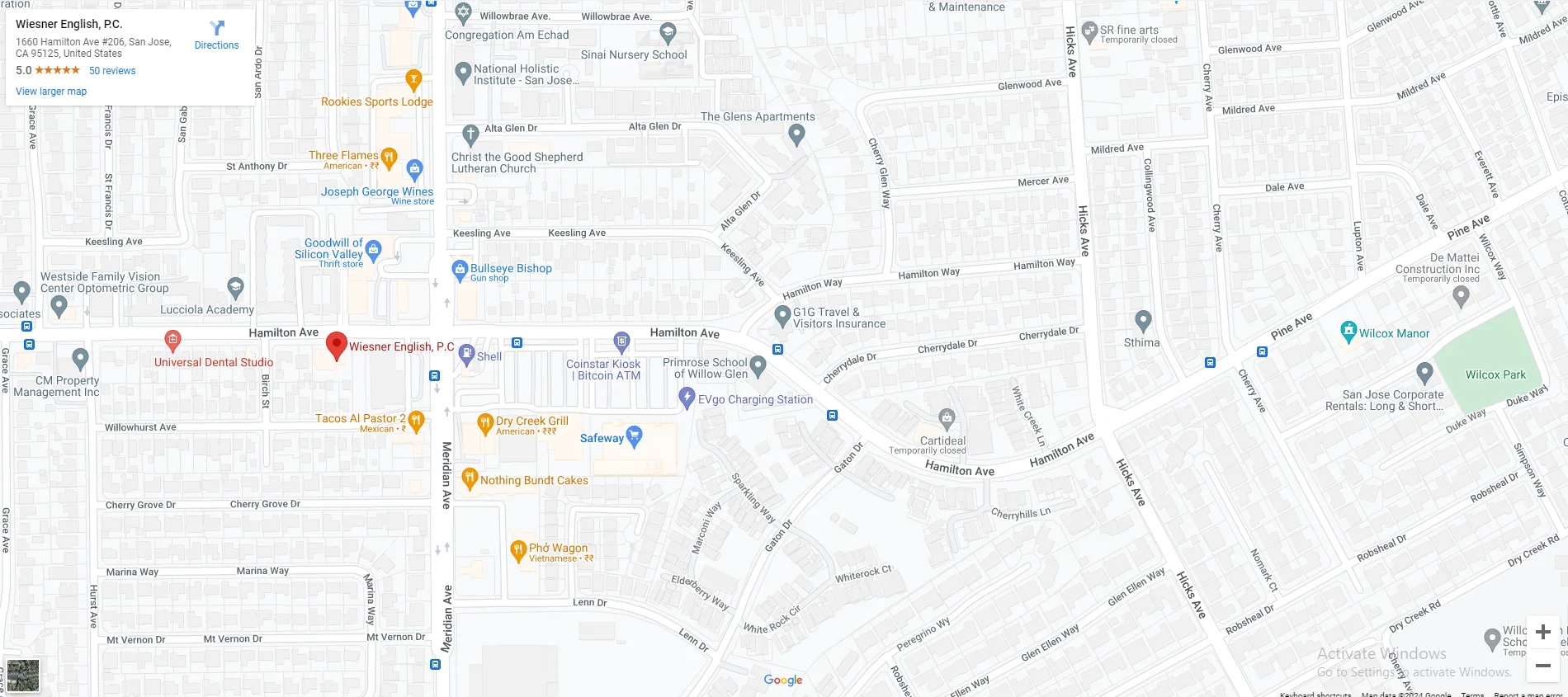San Jose Workplace Falls Lawyer

San Jose Workplace Falls Attorney
The unfortunate reality of workplace accidents is that they can happen at the most unexpected times. This can dramatically impact the quality of a worker’s life as well as their family. It’s not uncommon to hear about workplace falls in San Jose and the devastating consequences that follow, including severe injuries or even fatalities. In these instances, a San Jose workplace falls lawyer can step in to ensure that any victims and their families receive compensation and support.
At Wiesner English, P.C., our team of attorneys has become well-versed in this field of law over the years. We understand how workplace falls can make it difficult to feel physically, emotionally, and financially comfortable. That’s why our firm is dedicated to providing custom and effective legal representation. We can ensure that no one feels lost or helpless in their workplace fall case in San Jose.
What Are the Most Common Workplace Fall Issues to Deal With in Court?
When a workplace fall case makes its way to court in San Jose, California, there are a number of different issues that can arise, and these will need to be addressed. Discussing them in court can help both parties reach a fair resolution while securing justice for the injured party. These issues can include:
Liability
One of the most important facts to identify in a workplace fall accident is who was legally responsible for causing the fall. There are many possible parties who could be responsible, including the employer, the property owner, an equipment manufacturer, or even a third-party contractor. To successfully establish liability, the court will need to examine the evidence. Then, it can try to unveil which party had a certain level of responsibility for the victim’s safety and how that was breached.
For example, this could be a safety manager who neglected to update or communicate certain safety protocols, which would have kept the injured victim safe. It could also include a lack of employee safety training or neglecting a piece of equipment’s required maintenance schedule. All this will be investigated to determine what circumstances led to the injuries, which can then be used to determine liability.
Severity of Injuries
How intense an individual’s injuries are from the workplace fall will also be a central component of the case. Some of the most common injuries sustained in these cases include broken bones, traumatic brain and spinal cord injuries, and even severe lacerations. All these can, unfortunately lead to long-term or permanent impacts on the victim’s physical or mental health.
The more severe an injury, the higher the final compensation package can be. More intense injuries will likely have higher claims for medical expenses, ongoing treatments, and even reimbursement for the pain and suffering that the individual has endured. To prove the need for a higher compensation package for injuries, detailed medical evidence and testimonies from healthcare professionals will be crucial to illustrate the extent of the injury’s impact.
Causation
There needs to be a clear link between the injuries that someone has endured and the fall at work. This will require an attorney to present clear and compelling evidence that proves this connection.
To supplement this evidence, an attorney may bring in a medical professional who can testify how the nature of the fall would contribute to the injuries they saw on their patient. This could help combat rebuttals from the opposing counsel that are not rooted in a professional’s opinion.
Economic and Non-Economic Damages
To appropriately determine how much compensation is needed, the court will need to look into both the economic and non-economic impact of the injury. Economic damages could include the incurred medical expenses, wages lost from not working, and the injury’s effect on the individual’s future earning capacity. In terms of non-economic damages, the court will investigate how much emotional distress and loss of enjoyment were caused by the injuries.
FAQs
Q: Can I Sue My Employer for a Workplace Injury in California?
A: While the workers’ compensation system is the primary route to receive funds for an injury at work, there are exceptions where you can sue your employer directly. For example, any evidence suggesting that your employer intentionally caused harm or neglected to secure workers’ compensation insurance can make them directly liable for the injury. To see if there is an opportunity to sue your employer, consult with a personal injury lawyer.
Q: What Is the Law for a Slip and Fall Accident in California?
A: The premises liability law in California covers slip and fall accidents. This law requires all property owners to maintain a safe environment for all visitors. If any evidence proves that the property owner knew about a dangerous condition and didn’t do anything to remedy it, they could be held liable for any damages that can be linked to that specific hazard. It’s on the victim and their attorney to prove that the owner’s negligence contributed to the injuries.
Q: What Is the Average Slip and Fall Settlement in California?
A: The average California slip and fall settlement award varies greatly, depending on how severe the victim’s injuries were, the specific circumstances of their fall, and the extent of the property owner’s negligence. A settlement could range anywhere from a few thousand dollars for minor injuries to hundreds of thousands, or even millions, for the most severe injury cases, where someone will suffer from long-term or permanent disability issues.
Q: What Happens If You Get Injured at Work in California?
A: As soon as you experience an injury at work, you need to report the injury to your employer to start a workers’ compensation claim. California requires all employers to offer workers’ compensation insurance to cover all medical expenses, wage replacement, and rehabilitation costs to their employees to proactively plan for injuries. Once the injury is reported, you need to be evaluated by a doctor. Use their medical reports to file your claim and receive compensation.
Contact Wiesner English, P.C., Today
If you have recently suffered from a workplace accident in San Jose, California, and are struggling to know where to turn, contact the workers’ compensation attorneys of Wiesner English, P.C., as soon as you can. We have a comprehensive knowledge of today’s workplace injury challenges and can stand by your side. Our firm can ensure that your claim accounts for the full extent of your damages. Contact us today to get started.
Request A
Free Consultation
Fields marked with an * are required





